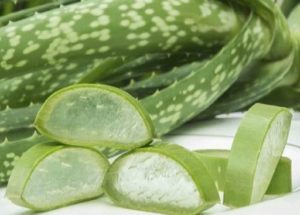
The Aloe vera plant, which belongs to Asphodelaceae (Liliaceae) family, is popularly known for its healing and therapeutic properties.
Its botanical name is Aloe barbadensis miller. The gel from the plant has been used for centuries for various medicinal purposes in several cultures including Greece, Egypt, India, Mexico, Japan and China. Aloe vera is a famous herb used in Ayurveda since ancient times.
Aloe Vera is called Ghritkumari in Sanskrit, meaning “young girl”. It is believed that the plant gives the woman youth, and it has a regenerating effect on the females, hence the name.
Health benefits
Aloe vera consists of various active components known for providing relief from ailments. These include vitamins, enzymes, carbohydrates, minerals, sugars, anthraquinones, fatty acids, hormones, lignin, saponins salicylic acids and amino acids. Aloe vera possesses anti-inflammatory, antibacterial, antiviral, antiseptic, analgesic, soothing, moisturizing, and cooling properties.
The herb contains lupeol, salicylic acid, urea nitrogen, cinnamonic acid, phenols and sulfur. These are antiseptic agents that have inhibitory action on fungi, bacteria and viruses. Aloe vera gel is also known to have a protective effect against radiation damage to the skin.
The health benefits of aloe vera include:
- Heals burns and other skin problems, such as wounds, acne, insect stings, bruises, eczema, and allergies.
- Strengthens the immune system by stimulating the macrophages and the white blood cells that fight viruses.
- Stabilizes blood sugar levels, and hence good for diabetes
- Improves the function of the digestive system
- Supports the reproductive system and blood circulation.
- Helps to treat constipation, inflammatory bowel diseases, dyspepsia, stomach and duodenal ulcers.
- Reduces cholesterol levels and improves heart function
- Prevents kidney stones
- Improves sexual function
- Moisturises skin
- Hydrates and strengthens hair and scalp, prevent hair fall, cures dandruff
- Induces menstruation and improves ovulation changes
Aloe vera is also a great detofixier, and it is very useful in conditions like arthiritis, eye diseases, tumours, enlargement of the spleen, liver complaints, vomiting, bronchitis, asthma, jaundice, piles.
Uses
It is used both internally and externally. Aloe vera is taken in the form of capsules or juice, as well as used as a vegetable in the diet.
For example, aloe juice is used for detoxification of the digestive system, to improve the digestion and the function of the kidneys, the liver and the gallbladder. A tonic herbal wine prepared from the fermented gel of aloe is also used as medicine for the treatment of anemia, female reproductive problems and liver diseases. Aloe juice is also used as an ingredient in Ayurveda medicine to induce periods.
The leaf pulp is applied externally for treatment of burns, boils, acne, ad skin disorders.
However, these uses of aloe vera are mostly based on anecdotal data.
Side effects
In sensitive individuals, topical application of allow vera may cause redness, burning, stinging sensation and rarely generalized dermatitis. Anthraquinones, such as aloin and barbaloin, in the plant are reportedly the main cause of the allergic reactions. It is advisable to apply it to a small area first to test for possible allergic reaction.
Oral intake of aloe vera can sometime cause abdominal cramps, diarrhoea, red urine, hepatitis, dependency or worsening of constipation. Further, prolonged use of oral aloe vera may increase the risk of colorectal cancer, while its laxative effect may cause electrolyte imbalances (low potassium levels).
Use of aloe vera is not recommended during pregnancy and breastfeeding as it may sometime lead to uterine contractions and gastrointestinal distress in the nursing infant.
References




 Driving Naari Programme launched in Chandigarh
Driving Naari Programme launched in Chandigarh






























